Posts by nsiteamadmin

Marketization of the North Korean Economy – A Korea Strategic Outcomes Virtual Think Tank Report
[Q7] Many analysts indicate that due to the partial marketization of the North Korean economy, the economy has stabilized somewhat. What were the key reasons the regime made the decision to marketize? What factors inhibit a broader marketization of the economy? This publication was released as part of SMA’s Strategic Outcomes in the Korean Peninsula […]
Continue Reading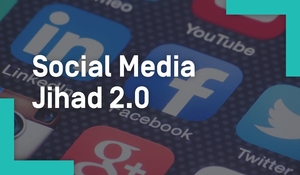
Documenting the Virtual Caliphates
Documenting the Virtual Caliphates Speaker: Bloom, M. (Georgia State University) Date: 27 July 2018 Speaker Session Preview SMA hosted a speaker session presented by Dr. Mia Bloom (Georgia State University) as a part of its SMA DHS Speaker Series. Dr. Bloom spoke about her Minerva-funded research, which examines the themes that emerge in ISIS propaganda, […]
Continue Reading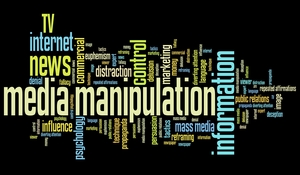
Analyzing Digital Traces of Political Manipulation: The 2016 Russian Interference Twitter Campaign
Analyzing Digital Traces of Political Manipulation: The 2016 Russian Interference Twitter Campaign Speaker: Lerman, K. (University of Southern California [USC] Information Sciences Institute [ISI]) Date: 24 July 2018 Speaker Session Preview SMA hosted a speaker session presented by Dr. Kristina Lerman (University of Southern California [USC] Information Sciences Institute [ISI]) as a part of its […]
Continue ReadingStrategic Multilayer Assessment (SMA) of Stability Pathways in Afghanistan- Phase I Insights
Strategic Multilayer Assessment (SMA) of Stability Pathways in Afghanistan- Phase I Insights Speakers: Canna, S. (NSI, Inc.); Cooley, S. (Oklahoma State University); Hinck, R. (Monmouth College); Krakar, J. (USARMY TRADOC G-27); Pagano, S. (NSI, Inc.) Date: 20 July 2018 Speaker Session Preview SMA hosted a panel discussion as a part of its SMA CENTCOM (Afghanistan) […]
Continue ReadingChina’s Role and Interests in Afghanistan
China’s Role and Interests in Afghanistan Speaker: Pantucci, R. (Royal United Services Institute [RUSI]) Date: 20 July 2018 Speaker Session Preview SMA hosted a speaker session presented by Mr. Raffaello Pantucci (Royal United Services Institute [RUSI]) as a part of its SMA CENTCOM (Afghanistan) Speaker Series. Mr. Pantucci first provided a brief history of China’s […]
Continue ReadingAfghanistan: Devolution and ‘Good’ Corruption
Afghanistan: Devolution and ‘Good’ Corruption Speaker: Chayes, S. (Carnegie Institute for International Peace [CEIP]) Date: 18 July 2018 Speaker Session Preview SMA hosted a speaker session presented by Ms. Sarah Chayes (Carnegie Endowment for International Peace [CEIP]) as a part of its SMA CENTCOM (Afghanistan) Speaker Series. During her discussion, Ms. Chayes provided insights on […]
Continue ReadingEmerging Trends in the Cryptocurrency and Blockchain Ecosystems
Emerging Trends in the Cryptocurrency and Blockchain Ecosystems Speaker: Blowers, M. (Peraton) Date: 17 July 2018 Speaker Session Preview SMA hosted a speaker session presented by Dr. Misty Blowers (Peraton) as a part of its SMA DHS Speaker Series. Dr. Blowers first spoke about the growing popularity of cryptocurrencies and how ease of access, attraction […]
Continue Reading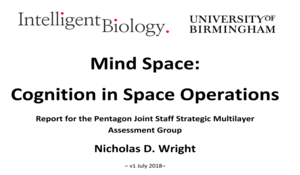
Mind Space: Cognition in Space Operations
Mind Space: Cognition in Space Operations Author: Dr. Nick Wright (Intelligent Biology) Executive Summary To conduct deterrence operations, or manage escalation, requires anticipating how others will decide to respond to our actions. Anticipating your adversary is imperative for offense or defense. Thus, it is crucial to understand audiences’ decision-making. But how can you put yourself […]
Continue Reading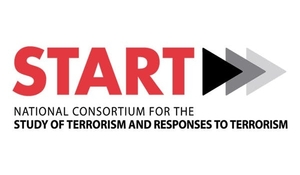
Malicious Non-state Actors and Contested Space Operations
Malicious Non-state Actors and Contested Space Operations Authors: Rachel Gabriel (Study of Terrorism and Responses to Terrorism (START)) and Barnett Koven (START) Executive Summary This report provides an analysis of potential threats to space-based systems posed by non-state actors. It places particular emphasis on the need to consider the space domain as part of a […]
Continue Reading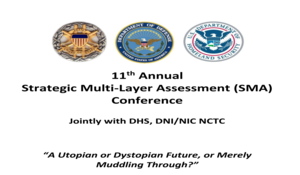
11th Annual SMA Conference – “A Utopian or Dystopian Future, or Merely Muddling Through?”
11th Annual SMA Conference – “A Utopian or Dystopian Future, or Merely Muddling Through?” Author | Editor: Aviles, W. (NSI, Inc.). Conference Theme This Conference assessed what today we rightly or wrongly perceive as historically unprecedented changes from the perspectives of politics and history, sociology, biology, information science, and technological innovation. There is a large […]
Continue Reading